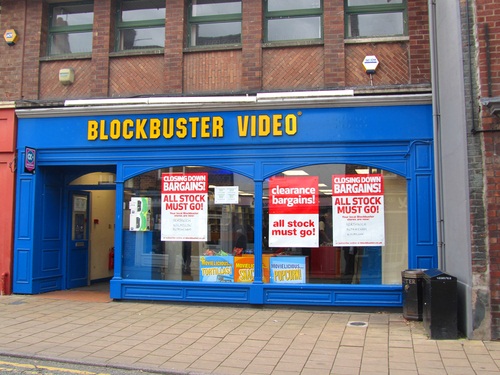When’s the last time you went to a Blockbuster store? Yeah, that’s what I thought.
The last time I tried to casually stroll into one of these video rental stores, it had already been shut down for weeks. Over the course of the last few years, Blockbuster has unfortunately become just a distant yet fond memory of the pre-streaming era. Now thanks to sites such as Netflix, HBO Go and Redbox, our beloved Blockbuster is riding off into the slowly setting horizon. Dish Network seems to have no problem helping it get there, either, having recently just revealed a plan to shut down 300 stores in the coming weeks.
The main problem here is not necessarily related to the video market. For example, despite Netflix’s unwelcome price increase in the past -- in the beginning of 2012, its Q4 2011 revenue spiked almost 50 percent from that time last year -- it still makes more than 200 million impressions per week. Having also managed to maintain a relatively solid revenue throughout last year, the company’s earnings even further increased to $905 million with slightly higher earnings of $0.13 per share by Q3 2012. Let’s not also forget that HBO Go is also trialing new standalone packages to satisfy high customer demand, which will most likely explode with success.

Image via Shutterstock
The problem is the absurdly high amount of layoffs – a staggering 3,000 employees – which certainly doesn’t help the U.S.’s current 7.8 percent unemployment rate. Closing hundreds more of these stores nationwide will undoubtedly affect those remaining stores that may not be doing so hot or who may be nearing the end of their lease, PCMag reported today. And after these stores are officially nixed, only 500 U.S. Blockbuster stores will remain, with 26 of them being near Dish’s Colorado-based headquarters, the report added.
This will pretty much make Blockbuster the newest addition to our endangered species list. Despite this, Dish, which purchased the floundering video-rental chain in 2011 for $320 million, still seems to be holding onto a string of hope for its acquired brand, as it did say that “we continue to see value in the Blockbuster brand.”
Perhaps it needs to see a little bit more, seeing how at the time the company was acquired, there were more than 50 percent more stores nationwide – 1,700 – plus a competitive streaming service. This could be the perfect yet unfortunate case of how a once-triumphant and unique service with massive potential for innovative expansion instead decided to swim against the current, and in doing so, seems it will likely drown.
Who knows, but the numbers certainly signal that Dish may be ready to throw in the towel.
Edited by
Rachel Ramsey